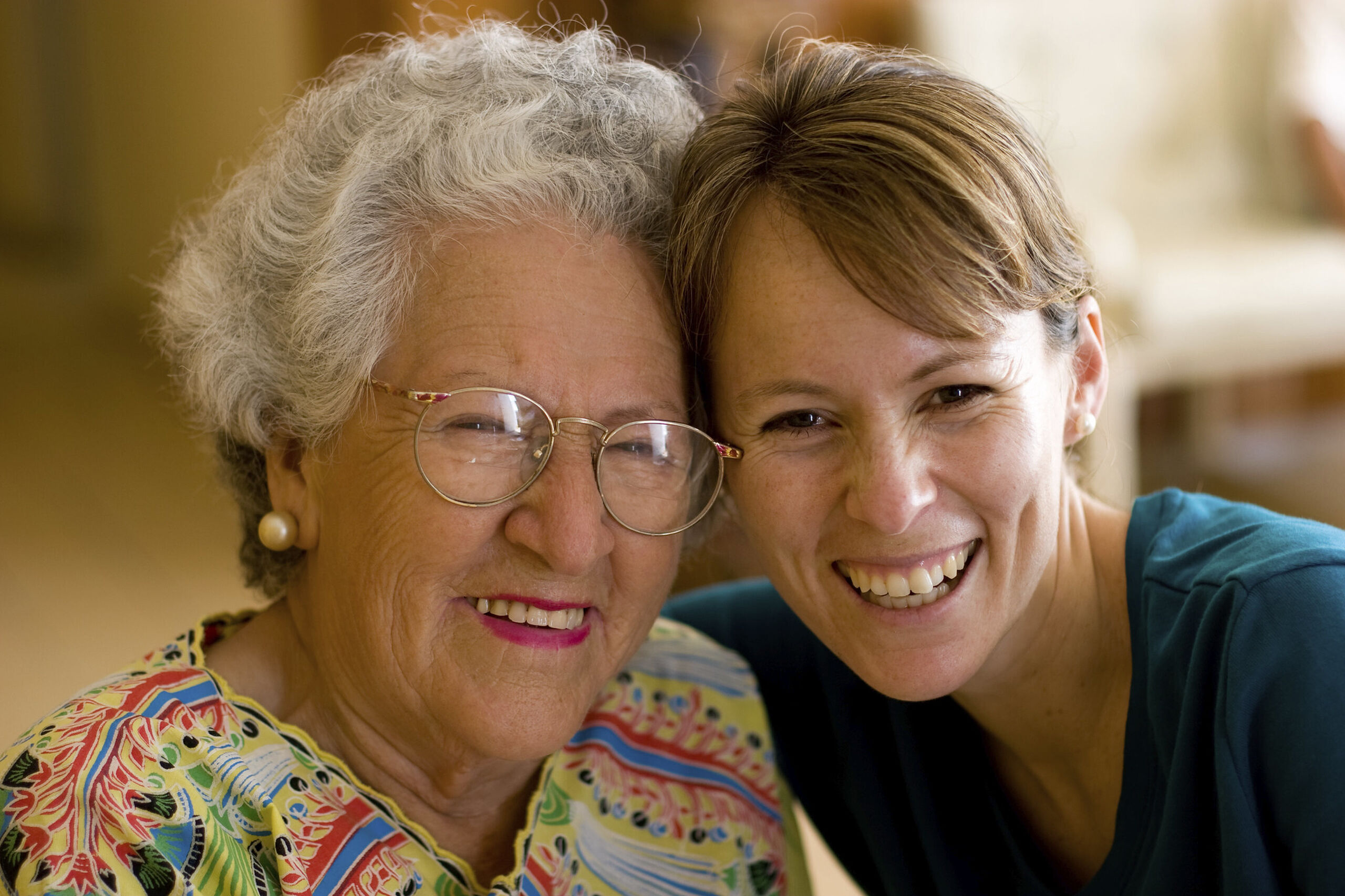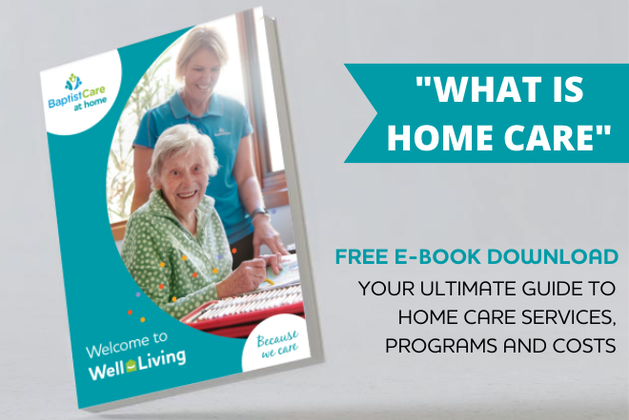How Home Care Empowers Us to Age Gracefully
From grey hair through to ‘senior’s moments’, ageing brings a wide range of changes to our bodies and minds.
Scroll to Explore

20 May 2022
Stories
| Home Care
From grey hair through to ‘senior’s moments’, ageing brings a wide range of changes to our bodies and minds. Those who cope best tend to be great at adapting and at making the most of what life offers. Home care offers you the freedom and flexibility to stay active and healthy.
Lorraine Murphy has always had a knack for putting people’s names to faces. As a bank clerk and then a GP practice manager during her working life, she kept track of hundreds, if not thousands, of individuals in her head, rarely making a mistake. Ageing has changed things…
In recent years, the active 76-year-old admits her ability to recall an individual’s name on the spot has declined which prompted her to investigate home caring services. “I might be in a situation where I want to introduce someone and I simply can’t remember their name,” she says. “It’s embarrassing because I might know them quite well.”
Lorraine is far from alone in noticing changes to her ability to recall names as she grows older. A decrease in the density and overall size of our brains is a perfectly natural part of the ageing process, and this can lead to some difficulties with recall.
But just like the other challenges that we encounter on our ageing journey there are solutions to the problem. There are strategies that can help us continue to get the most out of life, for as long as possible.
Take Lorraine’s simple, no-nonsense work-around to temporarily forgetting someone’s name. “I just ‘fess up if need be,” she says. “I’ll say, ‘I’ve had a mental block and although I know you well, I can’t remember your name right now’. People’s usual reaction is to say, ‘I’m so relieved – I have the same problem!’
So, what are the other challenges people can expect as they age? And what are some of the solutions we can put in place to age gracefully and live happily in our own homes, for as long as possible?
OUR SENSES
Our sense of hearing, sight, smell, touch and taste are the way we experience, monitor, and enjoy the world around us. The ageing process tends to make each of these senses less acute, with different individuals experiencing declines in different ways.
In terms of our vision, deterioration of the eye lens mean we may have trouble seeing things in low-light conditions, while our perception of colour may change. At the same time, our eyes may be less capable of producing tears and our lenses may become cloudier.
Some people experience hearing loss that makes it difficult for them to distinguish high-pitched sounds and to understand individual speakers in noisy, complex environments. Changes to structures in the ears can also undermine our sense of balance.
A decline in the number of taste buds and olfactory receptors in mouths and noses, meanwhile, can lead to less intense taste and smell sensations. And a decrease in blood flow and the sensitivity of nerve endings, means that some people experience a decline in their ability to discern pain and touch. They may not notice when they are becoming chilled or if they have sustained small injuries.
All is not lost, there are a host of strategies to help us adapt to these changes and live full lives.
Lorraine, for example, is aware of her difficulties seeing in darker conditions and plans her driving times accordingly. She also uses trifocal glasses, so she can clearly perceive objects in the distance, middle ground and nearby. Eye drops can help those with dry eyes.
While Lorraine hasn’t noticed any real decline in her hearing, regular hearing checks and the use of hearing aids can boost the hearing of those who need them. Scheduling social arrangements for less noisy environments can make it easier for those with hearing issues to understand conversations.
People with balance issues may be assisted by home modifications, or equipment that supports them as they move about. Participating in a falls-prevention program or undertaking a home exercise program developed by a physiotherapist, are also good ways to help build strength and balance.
If you’re enjoying food less, changes to the way you spice and season your food can help.
If you are experiencing a reduced sense of touch, it’s a good idea to keep an eye on the weather forecast and dress accordingly, rather than relying on your sense of whether it’s hot or cold.
Keep an eye out for small burns, cuts and abrasions that might need dressing.
OUR MUSCLES AND BONES
Changes to our muscular-skeletal system as we age can make it harder for us to do many of the activities, we took for granted when were younger.
One part of this is a decline in our bodies’ muscle mass, which begins at the tender age of 30. The amount of muscle fibre in our bodies and the size of the fibres decreases, gradually reducing strength.
This loss of mass puts extra weight and pressure on our joints as well as the cartilage and connective tissue in our limbs and spine. We lose cartilage and suffer injuries in our joints.
Over time, this can lead to weakness and permanent changes. The spinal column, meanwhile, becomes compressed and bones spurs may appear on the vertebra.
At the same time, our bones lose calcium and other minerals and become more brittle, making us more susceptible to breaks when we fall over. This is a particular challenge for women over 60. Arthritis can occur in bones across the body leading to symptoms including pain, swelling, redness, heat, stiffness and reduced movement.
Lorraine says she has nodules on her fingers and is beginning to feel the effects of arthritis and to see its presence in her body. “I look at my hands these days and think, ‘hello, Mum!,” she says. While she is still very active around the house, Lorraine uses her home care package for gardening services to cut her lawn as she doesn’t have the power to start the mower.
There are lots of similar strategies that can help with the other muscular skeletal challenges that come with ageing.
Moderate exercise (Lorraine walks and does yoga) can help maintain muscle mass, keep joints moving and slow bone loss. Regular exercise brings with it a host of other positive effects too.
Nutrition is also important, with calcium and vitamin D both vital for bone health. People over 70 should get 800 international units (IU) of vitamin D each day. They can get this either through supplements or eating vitamin-D-rich foods such as salmon, mushrooms and eggs. Those with osteoporosis should be prescribed medication by their doctors.
OUR BRAINS
There’s a scientific reason for those senior moments we all experience from time to time. From the age of about 70, we experience a decline in the size of the brain’s frontal lobe and hippocampus, areas crucial for critical thinking and recording new memories. The overall density of our brains also decreases and there’s a decline in white matter. Together, these two factors slow down processing and reduces cognitive function.
As a result, older people may find it more difficult to learn new things. They may find that it becomes harder to recall names, numbers and appointments. They could also have problems with multitasking.
While some loss of function is inevitable as you age, there are steps you can take to lessen the challenges.
A growing body of research suggests that people who eat a healthy diet, exercise, and get plenty of rest, tend to have smaller cognitive functioning declines.
Also important is managing stress, remaining mentally stimulated, and remaining socially active. Apps that stimulate the brain with puzzles, completing crosswords or Sudoku and playing bridge may also help. Lorraine makes sure she covers all the bases by remaining physically fit and socially and mentally engaged.
She contributes to the community by serving as a carer’s coach for people living with dementia. Lorraine also provides seniors with computer literacy training. She is a justice of the peace, is active within her church, and belongs to organisations, including the Trefoil Guild.
“My goal is to live in my house as long as possible,” she says. “Some friends have suggested moving into care, but while I love company, I like it on my terms. I’m fiercely independent in many ways.”
BaptistCare’s in home care services nsw help older people who need assistance, stay connected. These home care services include providing home care transportation to appointments, events, and even pastoral visits.
So, take heart….while there are challenges on the ageing journey but home care packages will allow you to remain independent and active
Having a positive attitude and looking for ways to keep active and enjoy life are great strategies for ageing well and there is no better way to do this than using a reputable home care package provider.
As Lorraine remarks, “Old age is a privilege. It’s important to remember that there are a lot of people that don’t get the chance to grow old.”
If you or someone you love is looking for help to remain socially active and engaged with the community, BaptistCare’s government funded home care services can help. Contact BaptistCare, the specialist in home care services for over 75 years.
Click the link below to learn more about BaptistCare's government funded home care services.
Home Care Packages | Home Care Services | Cost of Home Care Packages | How to Apply for Home Care.

Download our free E-book.
For us, it’s all about you. You are introduced to your own dedicated Care Facilitator who gets to know what is really important to you. This is your person. They will action and manage our friendly, multi-disciplinary care team and our wider network of quality service providers to meet your unique needs, wants and priorities.
Download our comprehensive E-book to learn more about Home Care Programs, Home Care Services and Home Care Costs.

Make an Enquiry
If you would like to know more, please contact us on 1300 275 227 or complete the enquiry form and one of our customer representatives will be in touch.